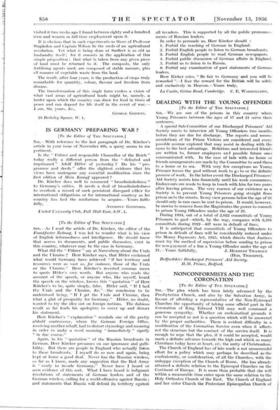DEALING WITH THE YOUNG OFFENDER
[To the Editor of THE SPECTATOR.] SIR,—We are one of the prisons in this country where Young Prisoners between the ages of 17 and 21 serve their sentences.- • - • • A special Sub-Committee of our Discharged Prisoners' Aid Society meets to interview all Young Offenders two months before they are due for discharge. The reports and recom- mendations of the Prison Visitors are considered and every possible avenue explored that may assist in dealing with the cases to the best advantage. Relations and interested friends are written to, former employers and possible future ones communicated with. In the case of lads with no home or friends arrangements are made by the Committee to send them to a home or to sea. With very few exceptions no Young Prisoner leaves the gaol without work to g.) to or the definite promise of work. In the latter event the Discharged Prisoners' Aid Society assists him financially until his work commences. Endeavours are made to keep in touch with him for two years after leaving prison. The very essence of our existence as a Society is to prevent Young Prisoners going straight from prison on to the streets. In my view persons below the age of 21 should only in rare cases be sent to prison. It would, however, be unwise to remove from the Magistrates the power to commit to prison Young Offenders under the age of 21.
During 1934, out of a total of 2,022 committals of Young Prisoners to gaol—which, by the way, compares with 3,591 committals during 1922-437 were in default of fines.
It is anticipated that committals of Young Offenders to prison in default of fines will be considerably reduced under the Money Payments Act, 1935, which directs that Justices must try the method of supervision before sending to prison for non-payment of a fine a Young Offender under the age of (Hon. Treasurer).
Bedfordshire Discharged Prisoners' Aid Society. II.M. Prison, Bedford.














































 Previous page
Previous page